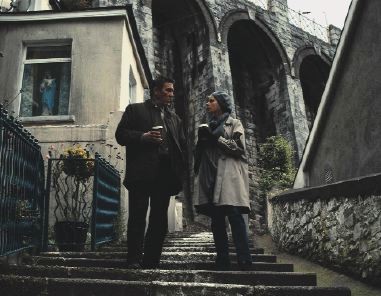The Eclipse

The modest Irish picture The Eclipse has slipped below almost everyone’s radar; it’s moving quietly across the country in brief art-house engagements. This contemporary ghost story about loneliness and connection is worthy of attention.
The setting is a small seaside town in Ireland, where an annual literary festival draws some celebrities. Lena Morelle (Iben Hjejle) is a London-based novelist, Nicholas Holden (Aidan Quinn) an Irish American who had a one-night stand with her and would like to parlay it into a full-blown affair. The other thing these two literary lights have in common is Michael Farr (Ciarán Hinds), a high-school woodworking teacher who moonlights during the festival as a chauffeur—and the movie turns out to be his story. Michael hasn’t recovered from his wife’s death, and he’s trying to raise two kids by himself. Lena’s breakthrough novel, The Eclipse, is a ghost tale rendered as realism; Michael relates to it because lately he’s begun to see spirits.
The film is adapted from Billy Roche’s story by the gifted playwright Conor McPherson, who also directs. It’s his third movie, yet the direction is awkward in places. The pacing is inconsistent, the film stalls now and then—though there’s nothing you would want to cut—and the visuals are a little fussy, too carefully arranged, as if he got carried away with the novelty of the camera. Still, The Eclipse translates McPherson’s distinctive sensibility to the screen.
The first of his plays to reach these shores, The Weir, is set in a sleepy pub where five characters exchange stories of their brushes with the supernatural. The audience doesn’t see any ghosts, yet the play casts an unmistakable spell, like tales told around a bonfire in the wee hours. A live ghost provides the punch line in Shining City, and The Seafarer is about a man playing poker with the devil for his soul. Sure, McPherson uses these mysterious events as metaphors, but not merely as metaphors—it’s clear that he believes in the interaction of the living and the dead. Though he has a poet’s ear, like Lena he presents his spectral narratives in a realist style.
The ghosts that haunt Michael suggest emotion in its purest form—despair so great that it wants to drag him down with it, love so profound that it reaches from beyond the grave to convey messages of pity and release. The spirit that keeps terrifying him is, bafflingly, that of his father-in-law, who is still alive and paralyzed by depression in a home for the elderly. In a single scene, the great stage actor Jim Norton, who often appears in McPherson’s plays, manages to suggest a melancholy so overpowering that it has come to define him. It’s the melancholy the Renaissance playwrights write about with terror, melancholy that can encase your soul and close it off from God’s grace. When the old man’s ghost collars Michael, you sense that it hungers for a fellow sufferer.
Michael and Lena become friends. At first he’s reluctant to burden her with his anguish, but she draws it out of him. Their companionship is beyond Nicholas’s understanding. Just about everything is, because he’s the polar opposite of Lena—he’s incapable of getting past himself. Aidan Quinn, who has grown into a grizzled middle age, doesn’t show up often in movies anymore, and he’s so good in this one that you wish you could see more of him. He contributes a beautifully etched portrait of a man who’s shallow beneath his charisma, though he and McPherson don’t treat the character unkindly: they soften his jealousy and his psychosomatic allergy attacks into comic folly.
McPherson coaxes an empathic performance out of Hjejle, and Hinds is very touching as the widower struggling—as much for his children’s sake as for his own—to find his way back into a world that’s grown disorienting. Young actress Hannah Lynch gives a sensitive performance as his somber older child, who puts her concern for her dad’s grief before her own.
Michael’s newfound friendship with Lena and his lovely relationship with his daughter are what Virginia Woolf calls matches struck in the dark. The movie is about the possibility of illumination through human contact.




